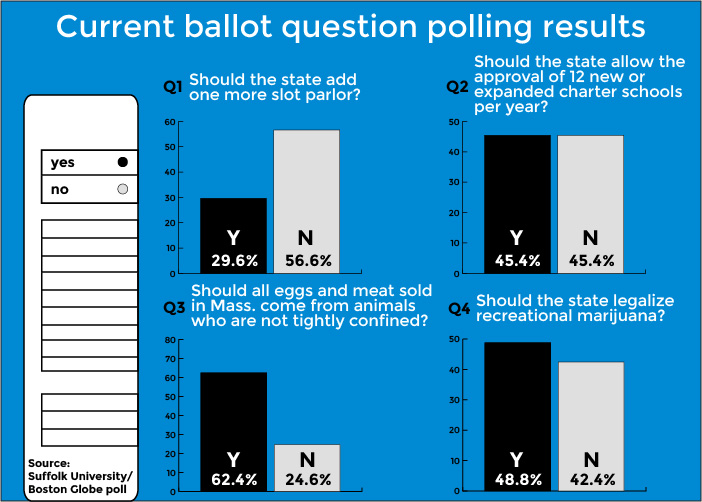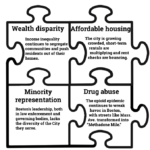
A survey conducted and published by Suffolk University and The Boston Globe Thursday illustrated how the Massachusetts ballot questions are polling with voters, revealing a close race for both Question 2 and Question 4.
The poll for Question 2, which would lift the cap of approved charter schools each year in Massachusetts, according to the initiative petition filed with Attorney General Maura Healey’s office, reflects the controversy around the issue, with public opinion split evenly down the middle.
Katarina Rusinas, the digital director for Save Our Public Schools, a grass roots ballot campaign organized against Question 2, said she feels satisfied that the opposition has seen a positive spike in public opinion, and she is confident that this trend will continue.
“Our organizers and volunteers work hard every day and see the change, but it was reassuring to see it in the new polls,” Rusinas said. “Once voters hear the issues, past just political advertising that our opposition is showing, they almost always decide to vote no.”
Despite the opposition’s increase in public support, Jacqueline Bart, the spokesperson for Great Schools Massachusetts, an organization in favor of Question 2, said the addition of charter schools will benefit the community.
“There are currently over 32,000 predominantly low-income families on charter school waitlists, oftentimes in the lowest performing districts,” Bart said. “Passing Question 2 will give more parents the right to choose the best public school for their children.”
The poll for Question 4, which seeks to legalize recreational marijuana, according to the initiative petition filed with Healey’s office, states that 48.8 percent of voters are in favor of legalization, while 42.4 percent oppose the ballot measure, according to the survey.
Jim Borghesani, the spokesperson for YES on 4, an organization seeking to legalize, regulate and tax marijuana in Massachusetts, said he feels hopeful that the poll results reflect the will of the voters, but acknowledges that the decision is still too close to call.
“We think it’s going to be very close on Election Day, so polls that show you ahead are always encouraging,” Borghesani said. “But we’ve said all along that this is going to be a very, very close election, and we’re doing everything we can to make sure that voters are educated about the benefits of ending prohibition.”
In light of these controversial ballot measures, several Boston residents agreed on the importance of going out and voting on these issues next week.
Christina Miller, 32, of Brighton, said she believes in the importance of voting no matter what.
“It’s important that people make their voices and opinions heard,” Miller said. “And you know it’s sometimes silly to say that every vote counts, but I really believe that it does.”
David Mohimani, 22, of Fenway, agreed with Miller that the residents of Massachusetts should make use of their right to vote in order to enact change.
“It’s important that if you feel strongly about an issue, that you should definitely go out there … and make something happen,” Mohimani said.
Nicholas Sapia, 29, of Back Bay, said he supports Question 4, reflecting the views of several other Boston residents interviewed by The Daily Free Press.
“[Marijuana] is relatively harmless, and I don’t think there’s a negative impact,” Sapia said. “The regulation and taxing of it is certainly a more effective way to go about it.”
Sapia, whose mother works in the public school system, also weighed in on Question 2.
“I’m really torn on charter schools,” Sapia said. “They can play an important role in holding public schools accountable, but at the same time, public schools here are pretty good and anything that’s going to take funding away from them is a challenge too.”




